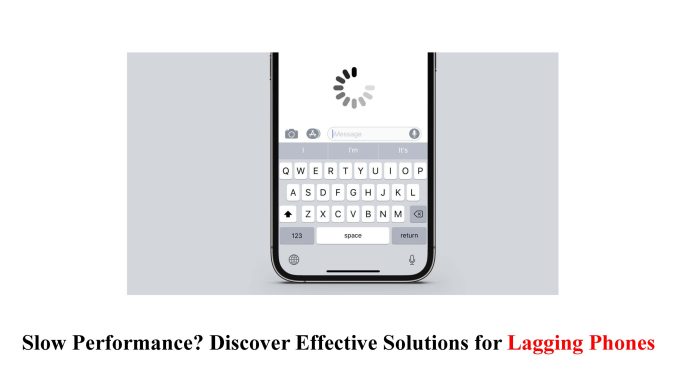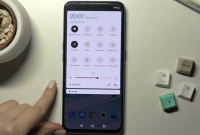
Introduction to Phone Lag
Is your phone feeling a bit sluggish lately? Are you constantly waiting for apps to load or experiencing frustrating delays when trying to navigate through your device? If so, it sounds like you may be dealing with the dreaded issue of phone lag. Don’t worry – you’re not alone. Many smartphone users have encountered this problem at one point or another. But fear not! In this blog post, we will explore the common causes of phone lag and provide you with some effective solutions to prevent and reduce it. So, get ready to wave goodbye to those infuriating moments of slow performance and say hello to a faster and smoother smartphone experience!
Common Causes of Phone Lag
1. Insufficient Storage Space:
One common cause of phone lag is having insufficient storage space on your device. When your phone’s internal storage is nearly full, it can slow down the performance and make it prone to lagging.
2. Outdated Operating System or Apps:
Using an outdated operating system or apps can also contribute to phone lag. Developers often release updates that include bug fixes and performance improvements, so failing to update them regularly can result in a slower device.
3. Too Many Background Processes:
Having too many background processes running simultaneously can overload your phone’s resources and lead to lagging. These processes could be apps running in the background, syncing data, or performing other tasks without your knowledge.
4. Bloatware:
Bloatware refers to pre-installed apps that come with your device but are unnecessary for most users. These apps take up valuable system resources and can significantly impact the speed and responsiveness of your phone.
5. Hardware Issues:
Sometimes, hardware issues like a faulty battery or overheating components can cause your phone to become sluggish as well.
It’s important to identify these common causes of phone lag so you can take appropriate steps to address them and optimize the performance of your device.
Tips for Preventing and Reducing Phone Lag
Is your phone lagging and causing frustration? Don’t worry, there are several effective solutions to prevent and reduce phone lag. Here are some helpful tips:
1. Clearing Storage Space: One of the most common causes of phone lag is insufficient storage space. Make it a habit to regularly delete unnecessary files, photos, and apps that you no longer use. By freeing up space on your device, you can improve its overall performance.
2. Updating Operating System and Apps: Outdated software can slow down your phone’s performance. Stay up-to-date with the latest operating system updates as well as app updates from the Play Store or App Store. These updates often include bug fixes and optimizations that can enhance your device’s speed.
3. Removing Bloatware: Manufacturers often pre-install unnecessary applications on devices known as bloatware. These apps take up valuable resources and contribute to sluggishness. Take the time to uninstall any unwanted bloatware from your phone.
4. Using Performance Boosting Apps: There are various performance-boosting apps available that can help optimize your device’s speed by clearing cache files, managing background processes, and improving RAM utilization.
Remember, preventing and reducing phone lag requires regular maintenance and optimization practices for optimal results.
Clearing Storage Space
One of the most common causes of phone lag is a lack of storage space. As we use our phones for more and more tasks, such as taking photos, downloading apps, and storing files, our storage can quickly fill up. When storage space becomes limited, it can slow down the performance of our devices.
To prevent phone lag caused by insufficient storage space, it’s important to regularly clear out unnecessary files and data. Start by going through your photo gallery and deleting any old or duplicate photos. Next, uninstall unused apps that are taking up precious space on your device.
Another effective way to free up storage is to clear the app cache and data. This can be done in the settings menu under “Storage” or “Apps.” Simply select the app you want to clear the cache for and tap on the “Clear Cache” button.
If you have important files or documents that you don’t want to delete entirely but still need more storage space, consider transferring them to cloud-based services like Google Drive or Dropbox.
By regularly clearing out unnecessary files and optimizing your device’s storage capacity, you can help prevent phone lag caused by a lack of available memory. Stay tuned for more tips on reducing phone lag!
Updating Operating System and Apps
Updating your operating system and apps is an essential step in maintaining the performance of your phone. Outdated software can often be a culprit behind lagging phones, as it may not be optimized to run efficiently on the latest hardware. Additionally, older versions of apps may have bugs or compatibility issues that can slow down your device.
To update your operating system, navigate to the settings menu on your phone and look for the “Software Update” or similar option. If an update is available, make sure you are connected to Wi-Fi and have enough battery life before initiating the process. The update will typically download and install automatically, but you may need to follow some prompts along the way.
Similarly, updating apps is crucial for improving their performance and fixing any bugs they may have. Open your app store (such as Google Play Store or Apple App Store) and go to “My Apps” or a similar section where you can see a list of all installed applications. Look for updates available for each app individually or choose the option to update all at once.
By keeping both your operating system and apps up-to-date, you ensure that they are running smoothly with all necessary optimizations in place. This can help prevent lagging issues caused by outdated software and keep your phone running at its best.
Removing Bloatware
One common cause of phone lag is bloatware – those pre-installed apps that come with your phone but you never actually use. These apps take up valuable storage space and can slow down your device’s performance. However, the good news is that you can easily remove them.
To begin, go to your phone’s settings and look for the “Apps” or “Applications” section. From there, you will see a list of all the installed apps on your device. Take some time to go through this list and identify which ones are bloatware. They may have names like “Games”, “News”, or even just random letters and numbers.
Once you’ve identified the bloatware, simply tap on it and select the option to uninstall or disable it. Keep in mind that some pre-installed apps cannot be fully removed but can at least be disabled so they don’t continue running in the background.
By removing bloatware from your device, you’ll free up valuable storage space and potentially improve its overall performance. So take a few minutes to declutter your phone and get rid of those unnecessary apps!
Using Performance Boosting Apps
When it comes to improving the performance of your lagging phone, one effective solution is to use performance-boosting apps. These apps are specifically designed to optimize and enhance your device’s speed and overall functionality.
One popular example of a performance-boosting app is Clean Master. This app not only helps you clear junk files and unnecessary cache, but it also provides features like CPU cooling, battery optimization, and antivirus protection. Another well-known option is DU Speed Booster, which offers similar features including junk file cleaning, memory boost, and game acceleration.
These apps work by analyzing your device’s storage space and identifying any potential issues that may be causing lag or slowdowns. They then take steps to resolve these issues by clearing out unnecessary files, optimizing system resources, and managing background processes.
However, it’s important to note that while these apps can certainly help improve performance in some cases, they are not a cure-all solution for every problem. If your phone is severely outdated or experiencing hardware issues beyond what software can fix, using a performance-boosting app may provide only temporary relief.
In addition to using performance-boosting apps, there are other steps you can take to prevent lag on your phone as well. Regularly clearing out storage space by deleting unused apps or moving media files to external storage can help free up valuable resources. Updating both your operating system and individual applications ensures you have the latest bug fixes and optimizations available.
Ultimately though if all else fails – sometimes it’s simply time for an upgrade! Newer phones often come with more powerful processors, memory, and improved software optimization – providing a smoother user experience overall.
With advancements happening rapidly in the smartphone market, it might be worth considering investing in a new device if yours continues to run slowly despite all the efforts made.
When to Consider Upgrading Your Phone
1. Outdated Hardware: If your phone is several years old, it may be equipped with outdated hardware that struggles to keep up with the demands of modern apps and software updates. This can result in sluggish performance and lagging issues.
2. Lack of Software Support: As technology advances, older phones may no longer receive software updates from manufacturers or developers. Without these updates, your phone’s performance can suffer over time.
3. Limited Storage Capacity: Running out of storage space on your device can significantly impact its performance. When you constantly have low storage, it makes it difficult for your phone to operate smoothly and efficiently.
4. Incompatible Apps: Newer apps are often designed with the latest smartphone specifications in mind, meaning they may not function optimally on older devices. If you find that certain apps consistently crash or freeze on your phone, it could be a sign that an upgrade is necessary.
5. Battery Life Decline: Over time, smartphone batteries tend to degrade and lose their capacity to hold a charge effectively. If you’re frequently dealing with battery drain issues even after optimizing settings and usage habits, upgrading to a new device could provide a longer-lasting battery life.
6. Technological Advancements: The rapid pace of technological advancements means that newer smartphones often come packed with innovative features like improved cameras, faster processors, enhanced security measures, and better display quality.
To enjoy these benefits, you might consider upgrading your phone when these advancements align with what matters most to you in terms of user experience.
Overall, summing up all these factors will help you determine if it’s time for an upgrade.
It’s important to carefully assess how much the lagging affects your daily use and whether investing in a new device will solve the problem.
A newer model might offer significant improvements in speed, response times, and overall efficiency.
However, before making any decisions, take into consideration factors such as budget, researching for reviews, and gauging your personal needs and preferences.
Conclusion
Dealing with a lagging phone can be frustrating, but there are effective solutions to help improve its performance. By following the tips mentioned in this article, such as clearing storage space, updating your operating system and apps, removing bloatware, and using performance-boosting apps, you can significantly reduce phone lag.
However, it is important to note that these solutions may not always eliminate lag issues. In some cases, when your phone becomes severely outdated or cannot keep up with the demands of newer software and applications, it may be time to consider upgrading to a new device.
Remember that prevention is key when it comes to phone lag. Regular maintenance and optimization can go a long way in keeping your device running smoothly. So don’t let those annoying lags slow you down – take action today and enjoy a faster and more efficient smartphone experience!



Leave a Reply